Questionhi christina, could you tell me what i can do to help the tear staining around my little maltise area around his eyes and face i understand that their is somthing tha is taken internally could , is this so. thank you ula and jack
AnswerHaving tears down the face is one of the early warning signs of illness (see below). The best cure for the stains is to stop the excess tearing by improving the health with diet and decreasing toxins. If you take the 6 week teleclass you will learn all about that.
From the comfort of your home, take the incredible 6 week Teleclass/Webinar on the 7 Keys to Healthy Pets. You just call in each week (midday on Tues or Evening on Thurs). I will answer all your questions, even those you never thought to ask. It begins January 27, 2009 and for more information, to register and get your free gift - go to http://www.simpledogtrainingsecrets.com/7keys.html
If you register for the class and have more questions, I will give you 15 mins free consult with me by phone.
To clean up the tear stains, hydrogen peroxide works very well.
There are several products on the market to prevent the tear staining and most say they were created to help other health issues and a by product was removing the stains. That is because the product improved the overall health of the animal.
Feed a raw meaty bone diet (or something better than processed) and stop vaccinating except for Rabies - may be enough to improve health.
Dr. Christina Chambreau
EARLY WARNING SIGNS OF ILLNESS FOR DOGS AND CATS
Most health problems are the result of an underlying energy imbalance, made worse from poor diet and vaccination. They are rarely acute diseases (except injuries). Therefore, you may find that the problem does not clear up as you expect or it recurs. If so, you are dealing with an underlying predisposition to illness, and these clues to underlying ill health will help you select a remedy and monitor the results. As we cure animals of "disease", we find
that certain other "NORMAL" things go away, too. Do not be satisfied until most of the following symptoms are gone. In young, apparently healthy animals, these apparently "normal" problems may be the only indications to start treatment. This is only the beginning of a list - as more animals are cured we will find new levels of health.
SIGNS OF UNDERLYING ENERGY IMBALANCE OFTEN DEEMED NORMAL IN DOGS AND/OR CATS
SKIN: doggy smell; attracts fleas a lot; dry, oily, lack-luster coat;
excessive shedding; not grooming, ear problems - waxy, oily, itchy, recurrent mites; eye discharge, tearing, or matter in corner of eyes; raised third eyelid; spots appearing on iris; "freckles" appearing on face; whiskers falling out; fragile, thickened, distorted claws that are painful or sensitive to trim.
BEHAVIOR: Fears(of loud noises, thunder, wind, people, animals, life); too timid; too rough or aggressive (even at play); too hard to train; barks too much and too long; suspicious nature; biting when petted too long; hysteria when restrained; clumsy; indolent; licking or sucking things or people too much; not using litter box or not covering stool.
DIGESTIVE: Bad breath; tarter accumulation; loss of teeth; poor appetite; craving weird things(rubber bands, plastic, dirt, cat litter, paper, dogs eating dog or cat stools, rocks, sticks...); sensitivity to milk; thirst - a super healthy cat on non dry food will drink at most once a week; red gum line; vomiting often, even hairballs more than a few times a year; mucous on stools; tendency to diarrhea with least change of diet; obesity; anal gland problems; recurrent parasites.
STIFFNESS when getting up, early hip dysplasia; tires easily in hot or cold weather; can no longer jump up on counters, or go up or down steps.
TEMPERATURE: Low grade fevers - Normal for healthy cats and dogs is
100-101.5.
AGE & REPRODUCTION: Should live a long life (Shepards 17 years, Danes 12, cats 24). should be able conceive easily, deliver normally, and not pass on "genetic breed" problems.

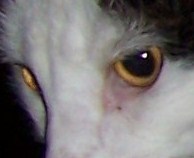 Cat with yellow eyes
Question
eyes
A friendly white female cat has recently
Cat with yellow eyes
Question
eyes
A friendly white female cat has recently
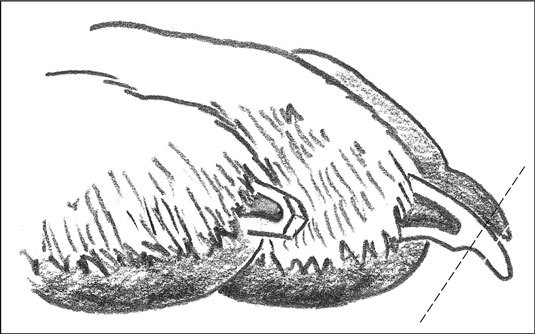 Dogs claws are to long.
QuestionMy dogs claws are very long, they are starting
Dogs claws are to long.
QuestionMy dogs claws are very long, they are starting
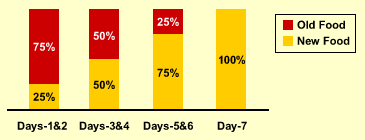 kitten with bloody stool
QuestionQUESTION: i have a kitten here, about 2-3 month
kitten with bloody stool
QuestionQUESTION: i have a kitten here, about 2-3 month
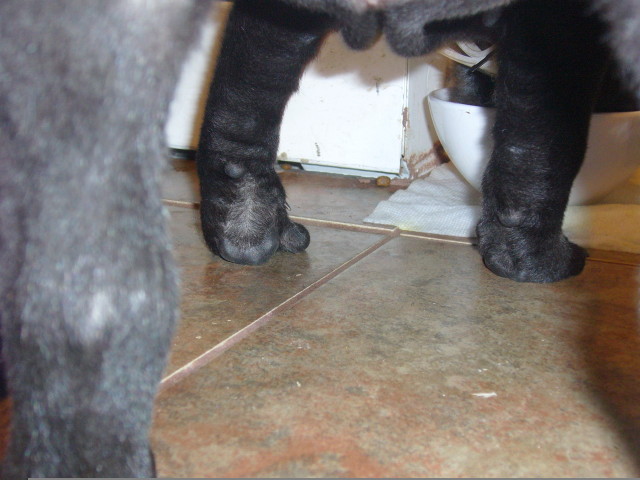 Two Front Legs Hurting on a Shar Pei
QuestionQUESTION: My two month old puppy (shar pei) beg
Two Front Legs Hurting on a Shar Pei
QuestionQUESTION: My two month old puppy (shar pei) beg
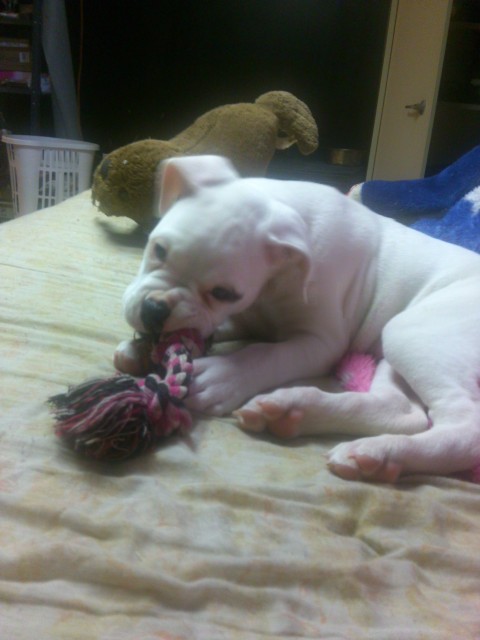 Possible Deaf Puppy.
Question
Paloma (white dove)
I have a 9 week old
Possible Deaf Puppy.
Question
Paloma (white dove)
I have a 9 week old